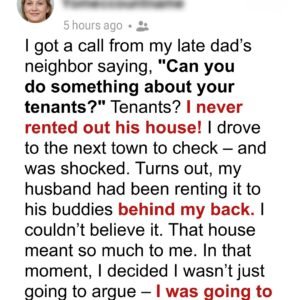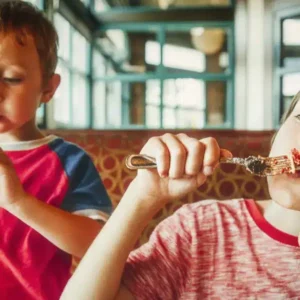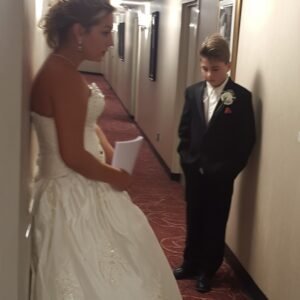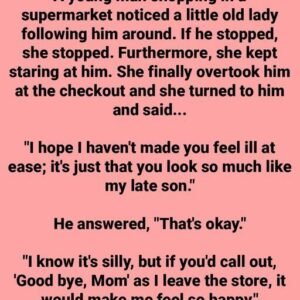It all started with a coffee shop and terrible Wi-Fi.
I was buried in my laptop, cursing my connection while a looming deadline breathed down my neck. That’s when a man beside me leaned over, smiled, and said, “Need a hotspot? Mine’s decent.”
That man was Scott. Kind eyes, sarcastic grin — the kind of smile that makes you exhale before you even realize you were holding your breath. We talked that afternoon, and honestly, we never stopped.
He noticed everything. The name of my old English teacher. My bizarre hatred for pulp in orange juice. He called his mother every day, which back then felt sweet. Loyal. Safe. The kind of man who would protect the people he loved.
We married quickly, and he moved into my home — the house I’d inherited from my aunt and spent years turning into my sanctuary. It was mine. My space. My rules. Or so I thought.
One week after the wedding, the doorbell rang.
I opened it to find his mother, Gloria, standing there with two massive suitcases and a smile that didn’t quite reach her eyes.
“I’m here to help you both adjust,” she said, stepping inside before I could even answer.
I stood frozen. The sinking feeling hit instantly.
That evening, I pulled Scott aside. “She’s moving in? Without even asking?”
He looked at me with that face I would come to resent—the please-don’t-make-this-a-fight face. “She’s struggling, Hope. She’s been alone since Dad passed. It’ll help her. She can help us too.”
I bit my tongue. “Two months. That’s it.”
He kissed my forehead and promised.
Gloria unpacked her suitcases and wasted no time treating my home like a project that needed fixing. She snooped through drawers that weren’t hers. She critiqued my décor like an uninvited HGTV host. She called my cozy living room “quaint” — her tone dangling between passive-aggressive and straight-up smug.
But what broke me down slowly, day by day, was how she disrespected my work.
I work from home as a UX designer. Meetings, deadlines, precision — none of it mattered to Gloria. “Screens don’t build character,” she’d mutter while vacuuming loudly during my presentations, always just off camera. Always timed perfectly.
It felt deliberate.
But the breaking point came quietly.
After a brutal workday, I finally closed my laptop and went to the kitchen. I poured myself a warm bowl of lentil soup I’d made earlier. It was simple, but after the day I’d had, it felt like comfort.
As I carried the bowl to the table, Gloria stormed in.
“If you don’t work, Hope, you don’t eat!” she barked.
Before I could even process her words, she slapped the bowl out of my hands. Ceramic shattered. Soup splattered across the floor. My favorite bowl—gone. My comfort—gone.
I just stared at the mess. The cumin and garlic hung in the air like an accusation. Gloria stood there, breathing heavy, convinced she’d done something righteous. Like disciplining a child. Or putting a dog in its place.
And something inside me clicked.
I didn’t scream. I didn’t flinch. I simply locked eyes with her and said calmly: “Get out of my house, Gloria.”
Her eyes widened. “You don’t get to tell me what to do! Wait till Scott gets home. My son will put you in your place!”
I didn’t argue. I walked to my bedroom, closed the door, and texted Scott.
“Come home. Now.”
He replied minutes later. “Can’t, babe. Swamped at work. Let’s talk tomorrow.”
I simply typed: “Be here tonight.”
When he finally arrived, I stayed in the bedroom. I heard the door open. Gloria’s rehearsed sobs began instantly. “She cursed at me! She broke MY favorite bowl!”
My bowl. My soup. My house.
Scott knocked and entered our room, already furious. “How could you talk to my mother like that?”
I stared at him. “Do you want to hear what actually happened?”
“She wouldn’t lie about this,” he snapped. “I know my mother.”
The dismissiveness was louder than any argument.
“She slapped the bowl out of my hands, Scott. She screamed at me over a bowl of soup.”
He didn’t blink. Didn’t move. His silence said everything. And then he spoke the four words that broke our marriage:
“I don’t believe you.”
And just like that, I let go.
“Pack your things. Both of you. You’re leaving tonight.”
“Hope, you’re overreacting!” he pleaded. “We’re married!”
“My house. In my name. Bought and paid for before I ever met you. Neither of you have any legal right to stay.”
He tried to argue. I didn’t listen. I walked into the bathroom and called my brother.
“Be there in 40,” David said. No questions asked.
David arrived with two of his friends—Marlon and Yusuf—quiet, calm, ex-military. Their silent presence filled every corner of my home with authority.
Scott tried pleading. Gloria went full theatrics—crying, wailing, bargaining. She even offered to cook dinner like we were still playing house.
“Ma’am, please start packing,” Marlon said softly.
By 1 AM, they were gone.
Gloria screamed every curse she could think of while stuffing her bags, vowing I’d die alone and unloved. I said nothing. Even when she hurled her final insult into the driveway night air, I stayed quiet.
When the door finally shut behind them, the silence was heavy. But for once, it wasn’t suffocating.
I walked into the kitchen, sat barefoot on the cold tile, and slowly picked up every shard of my broken bowl. Each piece felt heavier than ceramic should. It wasn’t just pottery—it was years of compromise. I was cleaning up more than a mess.
I was reclaiming myself.
I mopped the floor. Watched the water swirl into the drain. No rage. No heartbreak. Just quiet peace.
That night, I slept like a child. No tossing, no nightmares. For the first time in months, my house was mine again.
The next morning, a text from Scott:
“You owe my mom an apology. I can’t believe this is who I married.”
I stared at the screen for a long time. Then I typed one word.
“Lawyer.”
And that was it. The end. But it didn’t ache. It felt… clean. Like closing the door on something long overdue.
The house was still mine. My peace was mine. And as sunlight poured through the windows and coffee brewed in my quiet kitchen, I realized something else had returned.
Me.





